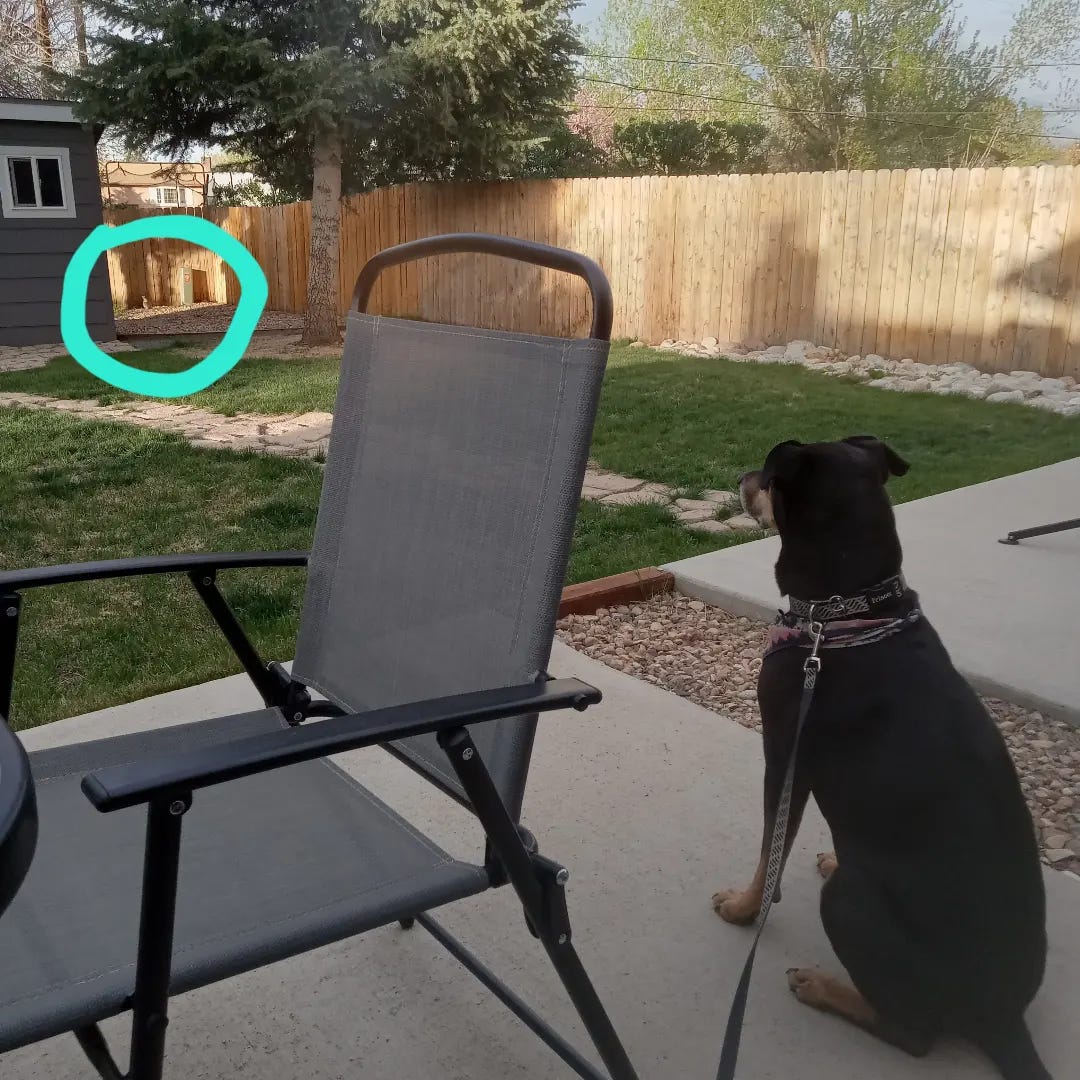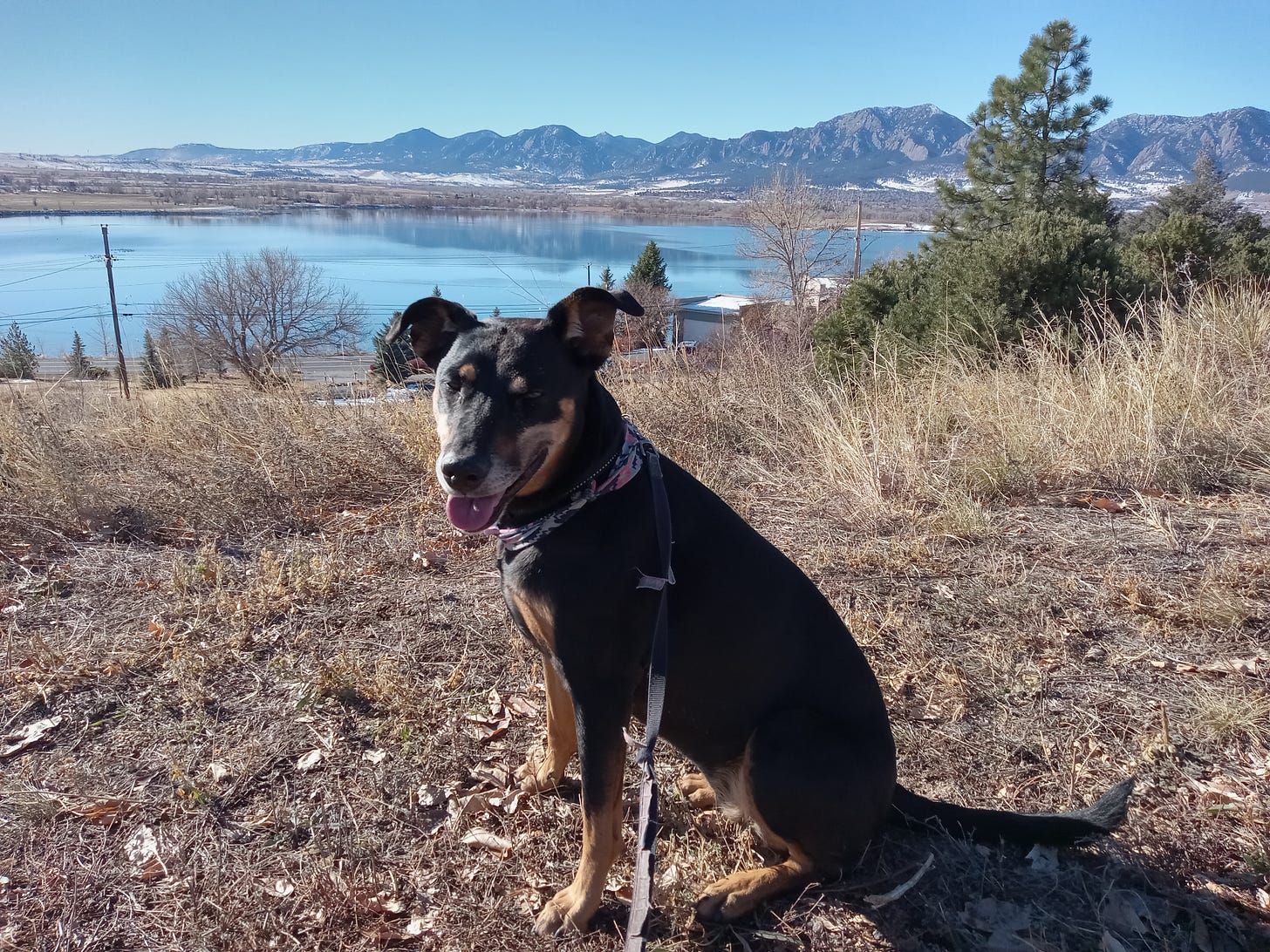On the kindness of strangers...who live in tents alongside freeways
Wherein the author seeks to turn a nettlesome personal "loss" into tangible gains for someone who needs it
A few weeks ago, Rosie's dog license became detached from its clasp at some point during a forty-minute run and was lost, probably alongside a path, in some weeds, or during a midrun creek-dunking. When I noticed this on the drive home, I muttered “fudge,” under my breath, and upgrading this expletive to a series of cries of “Fuck me!” as I passed an elementary school and gained an audience, opening the sunroof for maximal message distribution. As I learned in Alcoholics Anonymous from the original “Florida Man,” pain shared out loud is pain cut in half
The City of Boulder outsources its dog licensing to a company in Syracuse, New York. When it's time for a Boulder dog owner to renew or replace a license, this outfit still sends a notice claiming that delays owing to covid are likely to result in weeks-long delivery times. This is transparently a bullshit excuse, but if you've never been to Syracuse, imagine the grayest, most depressing place on Earth in January, then picture the city planners ensuring that every prominent structure propagates the illusion of permanent winter.
Fortunately, the first time I drove through it, I had sensitized myself by stopping in Utica and listening to the hiss of dissolving dopamine molecules deep within my own forebrain.
The opt-in terminal depressives who fulfilled my request got the license—as usual boasting Rosie's name and my number—to me in less than three weeks. I was so pleased with this unexpected “bonus” that I decided to prolong my reliance on the neurotransmitter-free by losing the replacement license within hours. I guess I'm not the best when it comes to complex machinery like a thin piece of metal with no moving parts and one fuckin’ job—securing in place another small chunk of metal.
I was obviously piffed (a state of mind combining “miffed” with “pissed”; see also “suspunishment,” any doping-related ban that actually has teeth) and in no hurry to order yet another license. On the other hand, roaming around with an ID-less canine is a bad idea. I carry her license info on my phone and in my head, but even if that might prevent a fine, it wouldn't help anyone find me if she ever got away.
I was therefore prepared to shell out another $15 today when I saw that I had a voicemail from an unfamiliar local number. When I listened to it, I learned that a man named Chris had found Rosie's license a few miles to northeast. (His real name isn't Chris, but it's what I heard, so it'll work here.)
When I called the number, Chris indicated that he was near 55th Street and Pearl Parkway. He sounded uncertain, like he was from out of town. I arranged to meet him at this intersection in fifteen minutes and hopped in the douchewagon with Rosie, who at least still had an intact collar and working leash. When I arrived, there was no sign of Chris, who'd said he was wearing a bright red shirt.
That was fine. Rosie, who'd already been on a 35-minute run, was happy for the extra activity near the dense the prairie-dog colonies southwest of this intersection.
When I called Chris again, I learned that he was actually outside a car dealership about a mile to the west along Pearl Parkway. We rapidly arranged for a new rendezvous point, and Rosie and I were off again.
When I saw a man in a red shirt standing on the side of the road, I could tell that he was homeless. This spot is close to some of the most exclusive condos and hotels in the city, and there are only three types of pedestrians: runners, affluent eastward wanderers, and the homeless.
I parked and approached the man. He was close to my age, a little shorter than me, and even skinnier. His veiny arms were heavily and expertly inked. He had short hair and, like any resourceful street-dweller, pants with too many pockets to count.
I had no baseline using which to form judgments, but Chris looked pleased to see me. He had a resigned sort of alertness about him, the demeanor of someone who means no harm but spends a lot of time, not by choice, around people who often and unpredictably do.
I was already guessing that Chris's interactions with people he saw as normies were infrequent and ungratifying. This one, I decided, would not be.
It took Chris about thirty seconds after meeting Rosie to explain that he stays in a campsite close to some railroad tracks in the area. I knew exactly where he meant; I run by this campsite four or five times a week, watching it shift over the past few years from a vantage point sixty meters away up a steep, artificial grade. The fact that the city hadn't demolished it suggested that its occupants were not especially unruly and had reached a detente of sorts, formal or informal, with the Boulder Police.
Chris had no particular reason to see me as an ally; I had a working car, so for all he knew I lived in a mansion in Left Hand Canyon. But before he got far into his disclosures, I told him bits and pieces of my own story guaranteed to establish my own dubious in-context bona fides—e.g., my many trips to the local detox and outdoor spots I'd holed up in expressly to drink myself unconscious in complete solitude.
It's not possible to fake having lived in certain desperately reckless yet habitual ways, not to someone who's been there. Chris knew I wasn't spouting platitudes out of an easily rationalized desire to manufacture empathy.
Empathy, however, was of limited use to this man. I gave him all six-plus bucks I had on me, realizing this was both grand and useless. That's a higher fraction of my net worth than I care to pretend.
From what I gathered, Chris has lived, or been, in Boulder for his entire life. He has spent time in prison and is on parole. He can't stay with his father, who lives one town away, because his father keeps guns on the premises. He has tried staying at the Boulder Shelter for the Homeless three miles north of downtown, but became discouraged by the level of ambient drunkenness, theft, and general mayhem, and decided the streets were a safer, more stable environment for himself and his partner.
He is a trained tattoo artist and has various lapsed certifications in trades like HVAC and welding. He would rather function, by his own definition, than simply survive. Prison was about survival. This was supposed to be different.
Chris wasn't able to spend much time chatting, because his girlfriend was back at the campsite and he didn't want to leave her alone for much longer. He explained that his girlfriend was in a wheelchair, the result of disease with a name he couldn't remember. I got the impression she has a progressive peripheral neuropathy, like Guillain-Barré syndrome or the result of poorly controlled diabetes.
I don't know Chris's whole story, and I've no doubt many of the missing details are unflattering. I do know there has to be a place where he's eligible to stay and can find work. And no one with progressive paralysis should be out in the elements.
Chris saved me a little time and money, but I consider his actions today to have been incredibly selfless and generous. By myself, there isn't much I can do for him. But thanks in large part to my own precarious past, I know people who can and whose lives revolve around helping people like Chris and his partner. And I have his number.
This post is rich in pathos and promise, but will be the equivalent of a fart through a kazoo if there is no follow-up. I don't think I'll need reminders to write about that process, but if I'm silent on this for more than a week, every one of you is welcome to draw your electronic fingernails up and down the chalkboard here until that changes.




